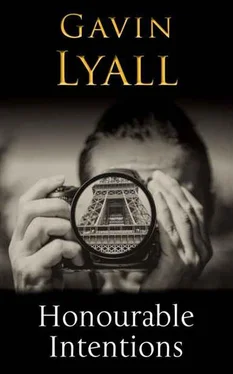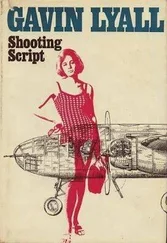Gavin Lyall - Honourable Intentions
Здесь есть возможность читать онлайн «Gavin Lyall - Honourable Intentions» весь текст электронной книги совершенно бесплатно (целиком полную версию без сокращений). В некоторых случаях можно слушать аудио, скачать через торрент в формате fb2 и присутствует краткое содержание. Год выпуска: 2014, Издательство: PFD Books, Жанр: Шпионский детектив, Исторический детектив, на английском языке. Описание произведения, (предисловие) а так же отзывы посетителей доступны на портале библиотеки ЛибКат.
- Название:Honourable Intentions
- Автор:
- Издательство:PFD Books
- Жанр:
- Год:2014
- ISBN:нет данных
- Рейтинг книги:4 / 5. Голосов: 1
-
Избранное:Добавить в избранное
- Отзывы:
-
Ваша оценка:
- 80
- 1
- 2
- 3
- 4
- 5
Honourable Intentions: краткое содержание, описание и аннотация
Предлагаем к чтению аннотацию, описание, краткое содержание или предисловие (зависит от того, что написал сам автор книги «Honourable Intentions»). Если вы не нашли необходимую информацию о книге — напишите в комментариях, мы постараемся отыскать её.
Honourable Intentions — читать онлайн бесплатно полную книгу (весь текст) целиком
Ниже представлен текст книги, разбитый по страницам. Система сохранения места последней прочитанной страницы, позволяет с удобством читать онлайн бесплатно книгу «Honourable Intentions», без необходимости каждый раз заново искать на чём Вы остановились. Поставьте закладку, и сможете в любой момент перейти на страницу, на которой закончили чтение.
Интервал:
Закладка:
“And you’d like to keep it that way,” the Commander nodded. “I quite understand that. But if His Majesty would say if this could be true-”
“Forgive me, but you may have missed my point. His Majesty is learning what being King of Great Britain means. That said, if he were now told that he might have fathered a bastard, he may well, given his inexperience except in the naval tradition of accepting personal responsibility, admit it openly. And where would we all be then?”
The Commander and Ranklin looked at each other. After a while, the Commander said: “So it may be a matter of saving the King from himself?”
“I don’t need to tell you that the British monarchy is going through a difficult patch. In his first four years on the throne, the King has faced the Prime Minister’s blackmail – it was nothing less – about reforming the Lords, radicalism, socialism, republicanism, women’s suffrage – and now the Irish Home Rule Bill and the likelihood of civil war in either North or South. A successful visit to Paris could make all the difference. It happens to be of particular political importance: the French loved the late King Edward and were rather annoyed that King George chose to visit Germany first – although it was, for a family wedding, quite unavoidable.
“Now you tell me that the visit is threatened by prospective headlines trumpeting a Paris anarchist as the true heir to the throne. Oh, I know he can’t be, but that won’t stop the French press. This really couldn’t have come at a worse moment. So I ask again: are you sure this is pure coincidence?”
In a marginally controlled voice the Commander said: “And I repeat what I said a few minutes ago, since I haven’t learnt anything new since then: I’ve no bloody idea.”
Quite unoffended, St Claire leant forward and gave the fire a poke. Ranklin was coming to an odd – and almost reluctant – conclusion about him: he didn’t despise them. The normal reaction for anyone suspecting he was a spy was distaste, with at most some sympathy of the “I suppose someone has to do it” sort. But St Claire was treating them as brother officers who’d been handed a tricky task, that was all. Ranklin couldn’t help warming to the man.
Now St Claire was saying: “We seem to be talking about a time well before I joined the Household . . .”
“Around February 1890,” Ranklin said. “When Prince George was a naval lieutenant doing a gunnery course at HMS Excellent at Portsmouth.” Nanny’s scrapbook had given him that much.
“And that is the . . . the relevant time? Thank you, Captain . . . I should have asked this before: does anyone in the government know anything about this?”
The Commander said firmly: “Not from us. And I’ve no reason to believe they’d know from any other source.”
“Hm. Thank goodness for rather large mercies. So it wasn’t they who passed the problem to you?”
“It came to us,” the Commander said, “by a rather round-about route. I don’t know if you have the time . . . ?”
“I think I’d better have.”
When the Commander had finished, St Claire fetched a notepad from his table and scribbled. The Commander winced at seeing things committed to paper, but said nothing.
St Claire looked up. “And how many are aware of this claim? So far I’ve got the boy himself, his mother, this girl from Paris, yourself and Captain Ranklin. How many more in your Bureau?”
The Commander hesitated, then said: “I think I have to say ‘As many as I choose to tell’. If we’re to go on investigating, I need to pick the right man for each aspect of it. They wouldn’t be in the Bureau if they weren’t trustworthy.”
The old bastard does stick by us, Ranklin thought. Though, mind you, to say anything else would reflect badly on himself. Still, it does bypass the problem of explaining O’Gilroy.
“Very well. You say the boy’s lawyer doesn’t want to know? I assumed Mr Noah Quinton -” the emphasis showed that Quinton’s reputation had got as far as the Palace “- wanted to know everything, but I suppose he must have a strong instinct for self-preservation. And so far, no politicians. What about this American vice-consul and Miss . . . Mrs Finn? Is she that daughter of Reynard Sherring?”
“She is. They know that a secret – an alleged secret – is involved, but not what it is. I doubt the vice-consul wants to know more, he’s already concealing things from his superiors, but Mrs Finn . . .” And he looked hard at Ranklin.
“Not from me. But she does talk to people. More importantly, people talk to her.”
“So she remains,” St Claire said, “a weak link.”
“If we’re looking for weak links,” Ranklin said evenly, “we’ve got the boy himself, his mother and the girl Berenice Collomb. God knows what they’re going to do.”
“But in the short term,” St Claire said, “that seems to depend on the outcome of the case. It was going on this morning, wasn’t it?” He glanced towards his table and sighed. “I’m sure the world thinks that all I have to do is lift that telephone and I’m immediately in touch with the wisdom of Solomon. Whereas most of the time I daren’t even suggest the Palace wants to know something without starting a riot of speculation.”
“Let Ranklin call our office,” the Commander said promptly. “We’ve got a man in court and they should be breaking for lunch about now.”
So Ranklin found himself speaking to first the Palace switchboard lady and then the Bureau’s, both chosen for well-bred reticence rather than technical skill.
Behind him, St Claire was saying: “If it comes down to it, at least the current Home Secretary is a lawyer. And in my experience, lawyers seldom see the law as something rigid. More like a palette from which they can select the right colours for any situation. I’m sure that if he had a word with the Lord Chancellor – if that’s the right person – Bow Street would quickly get the idea that a verdict against extradition would be preferred. Even better if the verdict seems to hang in the balance, as you say.”
You can’t do that, Ranklin thought instinctively. But why not? He himself broke or ignored laws all the time, usually other countries’ but sometimes Britain’s as well; that was now his job. How was this different? Were there any lines to be drawn? And why was he drawing one at someone seated beside the fountain-head of justice itself proposing to rape the law and then pretend it was still virgo intacta?.
“It might get the French up in arms,” the Commander observed. “There’s an appeals procedure, I understand, which could spin it out another two weeks or more.”
“Hm. I’ll think about that . . . How am I to keep in touch with you, by the way?”
“I’ve decided to revive the old Steam Submarine Committee. Good practice to cloak a new purpose in an existing body and I think I’m still chairman of it, though it hasn’t met for ten years. Not since we decided that steam-powered submarines were pure balls, in fact. Ranklin here is the new secretary.”
Still muddled by his own emotions, Ranklin barely registered that he’d got a new job he hadn’t been told about. Then Jay came on the other end of the telephone.
“So,” the Commander went on, “if you mention the Committee in any telephone call or message, we’ll know exactly what you’re talking about.”
“And vice versa. Excellent,” St Claire murmured.
Ranklin put down the telephone and said tonelessly: “The case was adjourned for another day. The meat porter, Guillet, has gone missing.”
Sitting in a rocking corner of the “express” to Portsmouth, Ranklin watched the gentle Hampshire countryside unreeling past and thought of what he should have said to avoid being sent on this futile jaunt. Too late now, of course. And he couldn’t even alter the minutes of the meeting to make the injustice plain, because the Bureau kept no minutes. Good for secrecy, bad for clarity. People unconsciously developed what had been said until they were convinced that it had been said. Or agreed, or decided. Good minute-keeping prevented that.
Читать дальшеИнтервал:
Закладка:
Похожие книги на «Honourable Intentions»
Представляем Вашему вниманию похожие книги на «Honourable Intentions» списком для выбора. Мы отобрали схожую по названию и смыслу литературу в надежде предоставить читателям больше вариантов отыскать новые, интересные, ещё непрочитанные произведения.
Обсуждение, отзывы о книге «Honourable Intentions» и просто собственные мнения читателей. Оставьте ваши комментарии, напишите, что Вы думаете о произведении, его смысле или главных героях. Укажите что конкретно понравилось, а что нет, и почему Вы так считаете.











